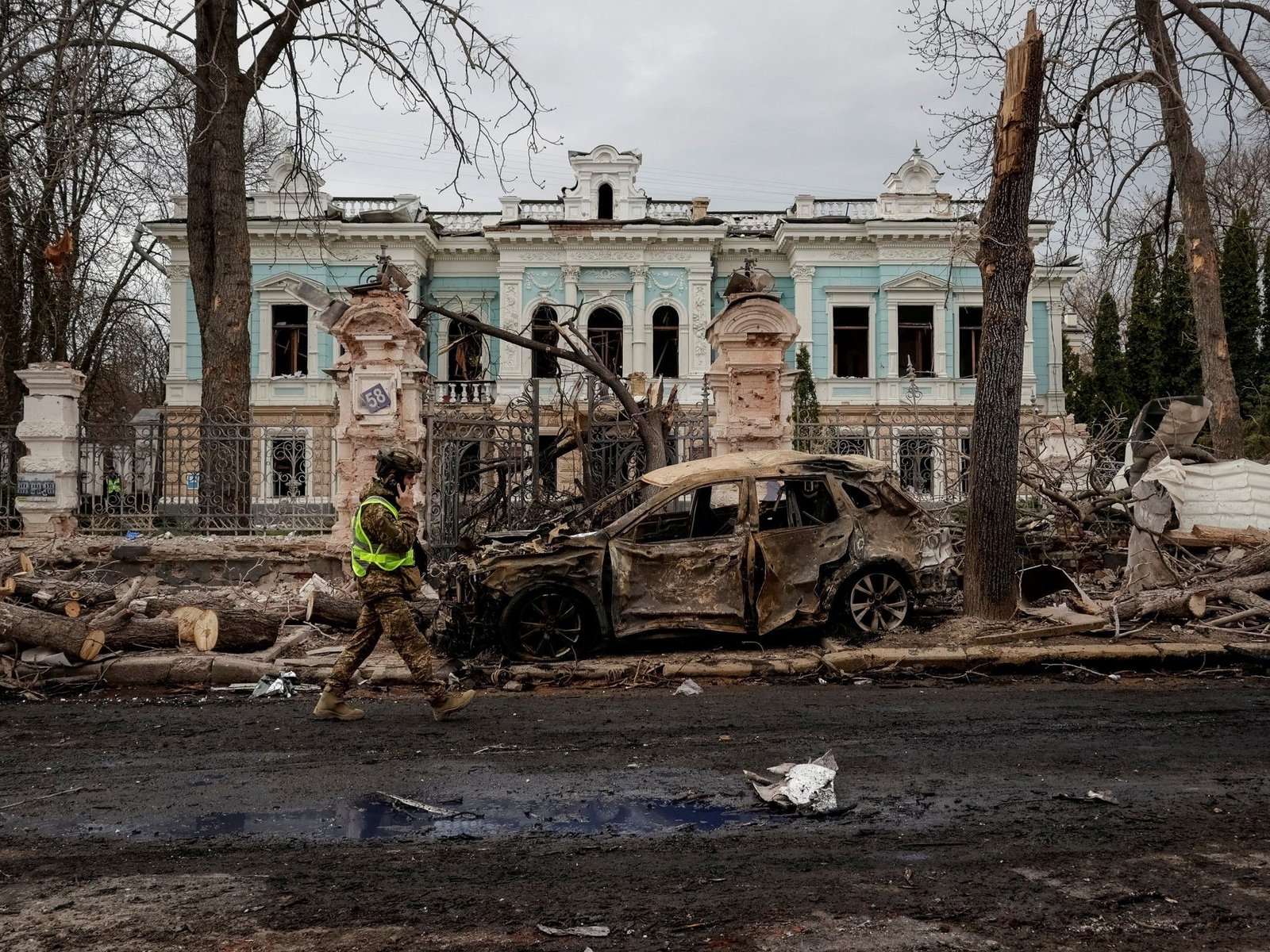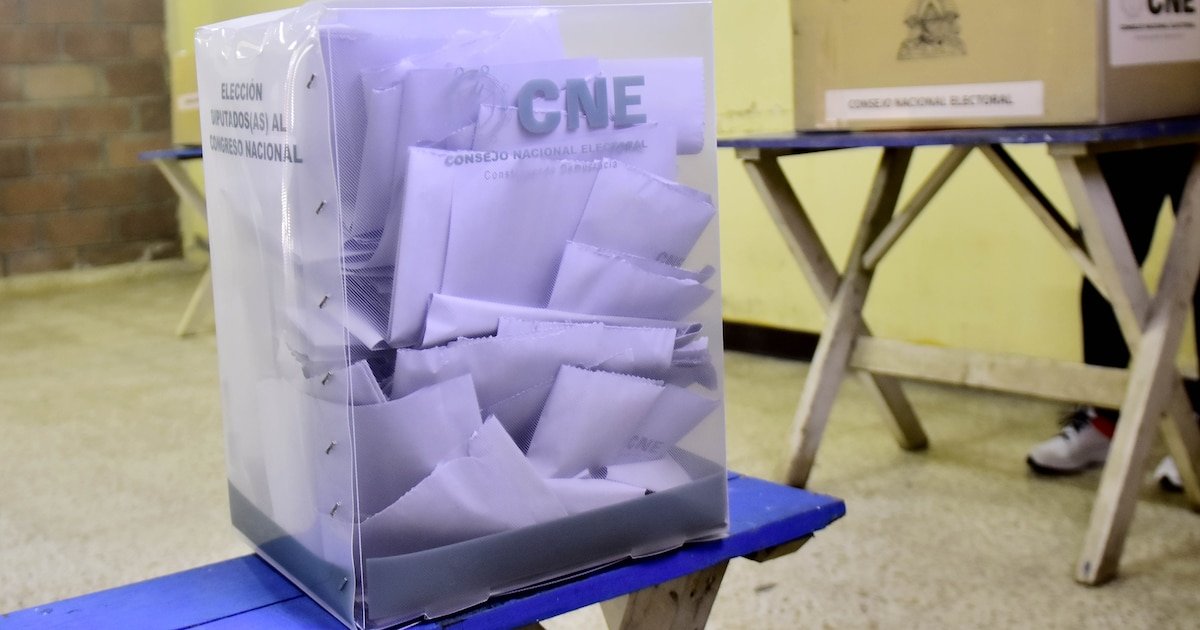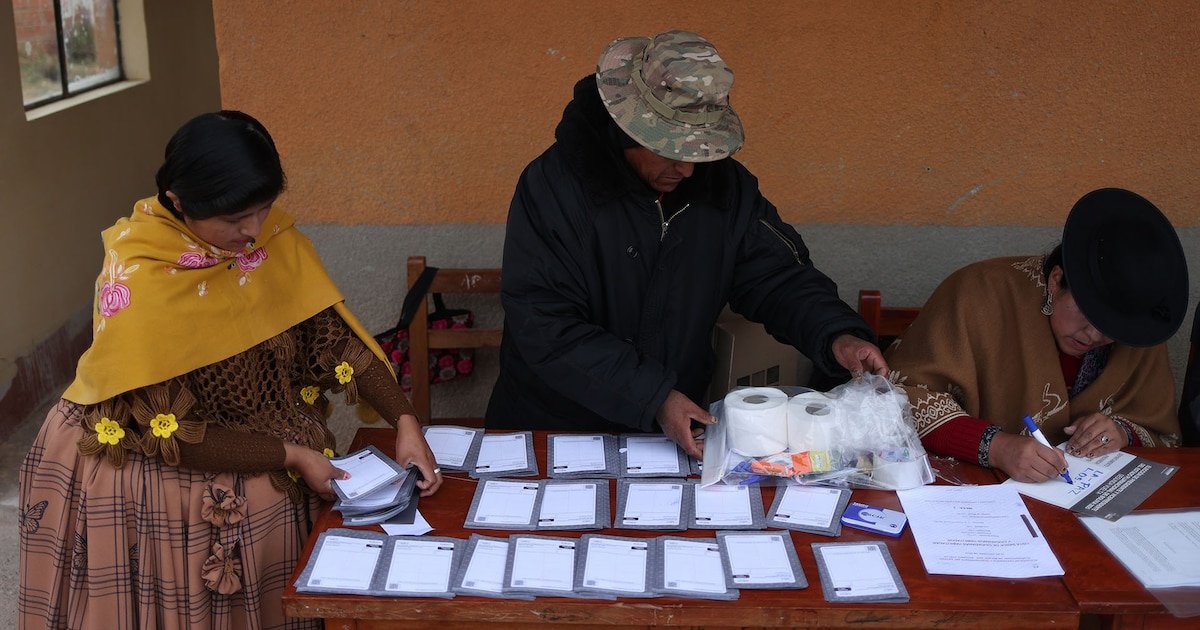INTERNACIONAL
La invasión rusa a Ucrania: el amor en tiempos de guerra

INTERNACIONAL
Elecciones en Honduras: los ciudadanos acudirán a votar en medio de la polarización y las acusaciones de posible fraude

Este domingo, los hondureños concurren a las urnas para definir quién será su próximo presidente en una elección marcada por la polarización y denuncias de posible fraude. La contienda enfrenta a una candidata que promueve la continuidad del gobierno actual y a dos aspirantes con apoyo opositor, ambos distanciados de sus partidos tradicionales y con el objetivo de obtener el poder tras una tensa campaña.
Consejo Nacional Electoral (CNE) dispuso un despliegue especial de fuerzas de orden para garantizar un ambiente pacífico, una medida respaldada por la Organización de Estados Americanos (OEA) y observadores internacionales, quienes han destacado la importancia de la transparencia en este proceso decisivo.
Más de sesi millones de hondureños están habilitados para votar en más de 18.000 centros distribuidos en todo el territorio, en una jornada que definirá no solo la presidencia sino también la renovación del Congreso y gobiernos municipales.
De acuerdo con las últimas encuestas, tres de los cinco aspirantes presidenciales llegan prácticamente igualados: Rixi Moncada, abogada y figura cercana a la presidenta Xiomara Castro, compite por el oficialista Libertad y Refundación (Libre); el presentador Salvador Nasralla, quien busca la presidencia por cuarta vez, en esta ocasión representando al Partido Liberal; y el empresario Nasry Asfura, del Partido Nacional.
A continuación, la cobertura minuto a minuto:
CNE aprueba reglamento del TREP para dar a conocer los resultados preliminares
El Consejo Nacional Electoral (CNE) dio luz verde este sábado al reglamento del sistema de Transmisión de Resultados Electorales Preliminares (TREP), que se pondrá en marcha durante las elecciones generales de este domingo.
El reglamento define cómo se organizarán los equipos, las funciones asignadas y los procedimientos operativos necesarios para que las actas de cierre sean transmitidas de forma digital directamente desde los centros de votación hasta el sistema central encargado del procesamiento y publicación de los resultados preliminares.
america/america-latina/2025/11/30/nasry-asfura-rixi-moncada-y-salvador-nasralla-los-tres-candidatos-que-buscan-suceder-a-xiomara-castro-en-honduras/
El jefe de la misión de la OEA augura unas elecciones de “paz y tranquilidad” en Honduras

Eladio Loizaga, excanciller de Paraguay y titular de la misión de la OEA para la observación de los comicios, auguró una jornada de “paz y tranquilidad” en el país. A su vez, explicó que seguirá el proceso a través de la información que le remitan sus observadores.
“Auguramos que todo esto camine dentro de un marco de paz, de tranquilidad y responsabilidad por parte de la ciudadanía que va a asistir a ejercer un derecho constitucional muy importante, en la que definirán los próximos cuatro años de gobierno en la República de Honduras”, señaló Loizaga.
Los datos clave de la elección presidencial

Este año, el padrón electoral hondureño está conformado por 6.522.577 ciudadanos habilitados para sufragar, de los cuales 6.026.477 residen en el país y 496.307 en el extranjero, principalmente en Estados Unidos. Para este proceso, se habilitarán 5.744 centros de votación en todo el territorio nacional, y en Estados Unidos se abrirán centros en 12 ciudades para que los hondureños que viven allí puedan ejercer su derecho al voto.
El CNE informó que los centros de votación abrirán a las 7:00 a. m. y cerrarán a las 5:00 p. m., aunque las personas que lleguen antes del cierre y permanezcan en la fila tendrán garantizado su derecho a votar. En caso de fuerza mayor que impida el inicio a tiempo, las Juntas Receptoras de Votos podrán extender la jornada hasta las 6:00 p. m.
El único requisito para votar es presentar el Documento Nacional de Identificación (DNI). Quienes necesiten confirmar el centro de votación y la mesa correspondiente pueden hacerlo en el sitio web del CNE, ingresando los números del DNI sin guiones y la fecha de nacimiento.
La presidenta del Consejo Nacional Electoral (CNE) de Honduras, Ana Paola Hall, instó a los candidatos a la presidencia a demostrar madurez política en las elecciones generales del próximo domingo, presentando propuestas sólidas y comprometiéndose a reconocer los resultados oficiales. Durante una entrevista con la agencia EFE, Hall subrayó que el CNE es la única voz autorizada para anunciar resultados y señaló la importancia de que todos los participantes respeten el proceso y sus resultados.
La sanción por incumplir la ley seca
Durante esta jornada electoral, Honduras implementará la ley seca, una medida que prohíbe temporalmente la venta, distribución y consumo de bebidas alcohólicas en todo el país. Esta restricción estará vigente desde las 6:00 a. m. del sábado 29 de noviembre hasta las 6:00 p. m. del lunes 1 de diciembre
Aquellas personas que violen esta disposición podrán ser sancionadas con multas que van desde cuatro hasta diez salarios mínimos. El objetivo de la ley seca es contribuir a un clima de tranquilidad y orden durante el proceso electoral.

(Desde Washington, Estados Unidos) El vicecanciller de Estados Unidos, Chris Landau, exigió hoy durante una sesión extraordinaria del Consejo Permanente de la OEA que la presidenta Xiomara Castro y las Fuerzas Armadas garanticen la transparencia de las elecciones del próximo 30 de noviembre.
Las Fuerzas Armadas desplegaron el material electoral
El Ejército de Honduras inició el jueves 21 de noviembre la distribución del material necesario para llevar adelante los comicios. El despliegue comenzó en las instalaciones del Instituto Nacional de Formación Profesional (INFOP), en Tegucigalpa, desde donde partieron camiones cargados con urnas, papeletas, tinta indeleble y otros insumos electorales, destinados a diferentes regiones del país, incluidas zonas de complejo acceso.
El proceso se llevó a cabo en un contexto de creciente atención internacional y reiteradas advertencias sobre la importancia de proteger la independencia y la integridad de los organismos responsables de la organización electoral.
elecciones presidenciales en honduras 2021,interior,jornada electoral,urnas,votaciones
INTERNACIONAL
Bolivia inicia la carrera para las elecciones regionales en las que renovará más de 5.000 cargos públicos

El proceso electoral subnacional en Bolivia está en marcha tras la convocatoria del Tribunal Supremo Electoral (TSE), que fijó como fecha para los comicios el 22 de marzo de 2026. En esa elección se renovarán más de 5.000 cargos públicos —entre gobernadores, alcaldes, concejales y asambleístas regionales— en los nueve departamentos del país.
Aunque aún no se han registrado los frentes ni las candidaturas que van a participar, ya hay señales de competencia abierta: decenas de partidos y agrupaciones políticas comienzan a moverse buscando alianzas y candidatos para configurar el mapa político del próximo quinquenio, luego de las elecciones nacionales.
El vicepresidente de Bolivia, Edmand Lara, declaró su intención de presentar “candidatos propios” a través de una sigla política que aún no obtuvo personería jurídica, por lo que no se descarta que busque alianzas con otras fuerzas políticas, lo que podría marcar un escenario de tensión con el Partido Demócrata Cristiano (PDC) con el que llegó al poder.
En la previa de las elecciones también asoman algunas caras conocidas que habían estado alejadas de la arena política en los últimos años, como el ex alcalde de La Paz, Luis Revilla. En enero de 2022, el ex alcalde se declaró en la clandestinidad, luego de que un dirigente del Movimiento Al Socialismo (MAS) le iniciara un proceso penal en su contra por un supuesto sobreprecio en la compra de buses para el transporte público.

“Quiero decir que estamos volviendo con las manos limpias, estamos volviendo a demostrar nuestra inocencia ahora que la justicia ya no está influída por el poder político, vamos a poder presentar nuestras pruebas y vamos a demostrar nuestra inocencia”, declaró ante los medios tras su arribo a la sede de Gobierno. Sobre su futuro político, no descartó la posibilidad de participar en las elecciones subnacionales y dijo que antes hará una evaluación con los militantes de Soberanía y Libertad.
En Santa Cruz de la Sierra, la ex alcaldesa Angélica Sosa —que estuvo presa y envuelta en múltiples denuncias de corrupción— también señaló que su frente Santa Cruz Para Todos va a participar en las elecciones regionales, pero no confirmó oficialmente su postulación. “Nuestro compromiso va a ser solucionar todo y lo que me pida a mí el pueblo (…) nunca voy a decirle no a mi pueblo”, afirmó en un video.
En tanto, el gobernador y ex líder cívico Luis Fernando Camacho manifestó que buscará ser reelegido como máxima autoridad del departamento de Santa Cruz, luego de haber pasado más de la mitad de su mandato detenido preventivamente en la cárcel por acusaciones relacionadas con las movilizaciones sociales previas a la renuncia de Evo Morales en 2019.
Camacho recuperó su libertad en agosto, al igual que el ex líder cívico Marco Antonio Pumari, que enfrentaba los mismos cargos y que anunció su candidatura a la gobernación de Potosí.

El arranque de esta carrera electoral promete un periodo intenso de negociaciones, estrategias territoriales y definición de candidaturas para renovar el poder local en Bolivia.
El mandato de las autoridades que resulten electas coincidirá con el del nuevo presidente Rodrigo Paz, quien ha prometido reducir el centralismo y fortalecer la autonomía regional mediante la distribución de recursos en un programa que ha denominado “50-50”, por lo que estas elecciones pueden ser decisivas para una reorganización fiscal más equilibrada.
La semana pasada, el TSE confirmó que más de 200 agrupaciones ciudadanas regionales y 14 partidos políticos están habilitados para disputar los comicios y fijó el 22 de diciembre como fecha límite para la inscripción de candidaturas.
En el ínterin, la Asamblea Legislativa Plurinacional debe designar nuevos vocales electorales mediante un proceso de convocatoria abierta. Las autoridades electorales actuales —que condujeron las últimas seis votaciones— concluyen su mandato el 18 de diciembre.
elecciones
INTERNACIONAL
Paolo Sorrentino en Buenos Aires: Maradona como “un gran espectáculo”, el cine y la libertad creativa

Pasado el mediodía del sábado, llueve levemente en Buenos Aires como para confirmar que la ciudad tiene la banda de sonido de un tango de Piazzolla, melancólico e inmaterial. Paolo Sorrentino, uno de los directores más relevantes del cine mundial en el siglo XXI, fuma tranquilamente un cigarro en la puerta del Teatro Coliseo. Conversa con quien lo reconoce y se le acerca: cuenta que en los huecos de sus actividades desde que llegó el viernes por la mañana, ha comido buena carne argentina, visitó un club de tango y espera conocer la bella San Martín de los Andes (donde liderará, desde el lunes, un seminario para 50 jóvenes directores de todo el mundo).
Pero hay algo más importante entre sus objetivos de este viaje al sur del mundo. Napolitano y fan irredento de Diego Maradona -por si no bastaban sus películas, él se le hizo saber al mundo cuando en el momento cumbre de su carrera de cineasta, al agradecer el Oscar que había ganado por La Gran Belleza en 2014, le dedicó el premio-, dijo sin pestañear que “mi única expectativa en Buenos Aires era comprar souvenirs de Maradona. No tenía otras ambiciones que encontrar una tienda… Ayer me llevaron a La Boca, y había 400 locales de souvenirs. Así que mis expectativas han sido ampliamente satisfechas».
Por eso cuenta orgulloso que visitó el barrio de la Boca y estuvo en Bombonera e incluso, por intermedio de Dalma Maradona, pudo ingresar al palco del 10 en el mítico estadio de Boca. Solo lamenta perderse el Boca-Argentinos Jrs. de este domingo (“sus dos equipos”, suspira), pero enseguida le dice a Infobae Cultura con una sonrisa cómplice: “Tengo el domingo perfecto frente al televisor, primero veo Nápoli-Roma y después Boca-Argentinos Jrs.”

El amor de Sorrentino por Maradona es más que la devoción por un jugador sobrenatural de fútbol, e incluso por eso se permite teorizar el impacto de semejante personaje en su ciudad natal, Nápoles: “Maradona era un espectáculo y Nápoles es una ciudad que siempre ha amado el espectáculo. Es la ciudad teatral italiana más importante. Nápoles siempre ha sido una ciudad que hace de salir a escena su prerrogativa principal. Llegas y tomas un taxi: el taxista no solo te lleva a destino, sino que sale a escena, pone en acto una representación. Por eso nos gustaba tanto Maradona, porque él entendía el fútbol era un espectáculo, una representación, un ballet, un triunfo de conocimiento y de virtuosismos. También esto es el teatro”.
El sábado al mediodía lluvioso en Buenos Aires, Sorrentino atendió a la prensa local en una conferencia donde habló de Maradona (obviamente), pero también de sus inspiraciones, su estilo de trabajo y reivindicó a “Fellini, Scorsese y los directores norteamericanos de los años 90, de Tarantino a Abel Ferrara” como sus grandes inspiraciones. Luego se reunió con el jefe de gobierno de Buenos Aires, Jorge Macri, la ministra de Cultura Gabriela Ricardes, el embajador de Italia en Argentina, Fabrizio Nicoletti y Livia Raponi, directora del Instituto Italiano de Cultura que tiene su sede en la calle Marcelo T. de Alvear. Y por la tarde, en el Teatro San Martín, compartió un divertido y didáctico diálogo con el director de Bafici, Javier Porta Fouz, frente a una platea atenta y cómplice. El largo aplauso y ovación que coronó la conversación, así lo atestiguó.
“Estoy felicísimo de estar aquí en Buenos Aires porque es una ciudad en la que me siento natural inmediatamente… Porque es lo más parecido a Nápoles que pueda imaginar. Y claro, obviamente con los habitantes de Buenos Aires comparto la pasión que todos conocemos por Maradona. Este es un lugar que representa para mí una mezcla entre Nápoles y París, dos ciudades que amo mucho”, comenzó diciendo el autor de notorias películas que examinan el alma humana, casi siempre a través de una serie de diálogos existenciales que suceden en medio de una embriagante combinación de música e imágenes, a veces oníricas, muchas veces poéticas. Y siempre impregnadas de un tono nostálgico que sustraen al espectador y lo llevan a vivir sus propias cuestiones en un juego de espejos. Ahí están La Gran Belleza, La Juventud y Parthenope. Los amores de Nápoles para comprobarlo.

Pero, claro, el tema es Maradona: el hombre escribió y dirigió Fue la mano de Dios, su carta de amor a Maradona y el exacto momento en que la vida de un adolescente napolitano sintió que la tierra se movía -y no era por el Vesubio- cuando el morocho argentino de rulos apareció en el campo del estadio -entonces llamado “San Paolo”, hoy “Diego Armando Maradona”- en el verano de 1985. Y ya nada fue igual. Consultado por Infobae Cultura sobre lo que siente en caminar por las calles de la ciudad que pisó Maradona, responde: “Estoy muy emocionado y conmovido. Ayer me llevaron a la Boca y conocí a su hija Dalma y me llevó arriba al palco donde él veía los partidos de Boca. Para mí fue muy conmovedor y emocionante, porque bueno, hice una película sobre eso, lo expliqué en una película. Para mí Maradona no solo representa lo que representó para todos, es decir, la posibilidad de ver por primera vez cómo era realmente un gran espectáculo. Mi pasión por el cine nace, ante todo, de la pasión por Maradona, porque viéndolo en el estadio por primera vez a los 14 años, entendí lo que significaba el espectáculo».
Sigue: “Antes incluso que el fútbol, todo lo que tenía que ver con Maradona era el marco de un enorme, irrepetible espectáculo. Como un estreno en Broadway todos los domingos. Más allá de esto, por mi historia personal, estoy firmemente convencido de que Maradona me salvó la vida, porque yo debía estar en un lugar de muerte y en cambio estuve en un lugar de vida que era un partido de fútbol. Por esta razón, para mí todo lo que tiene que ver con Maradona es conmovedor: es el motivo por el que a los 55 años estoy aquí y no estuve muerto a los 17 años. Es algo que va más allá de la pasión por el fútbol y por un gran jugador. Es algo mucho más importante para mí“.
Claro que no todo fue monotemático. Ante una pregunta por las dificultades que atraviesa la industria del cine argentino frente a la política de recortes presupuestarios del INCAA, respondió con naturalidad que “esta dificultad económica la encontramos también en Italia. Allí también el Estado se está retirando de financiar el cine y entonces pienso que quizás haya analogías con lo que está sucediendo aquí. Pienso que es una visión miope, no solo respecto a la cultura, sino respecto a la economía. Al fin y al cabo el cine tiene el poder de vehiculizar el valor más importante para un país, que es su reputación. Italia no es un país que tenga grandes recursos, no tiene grandes materias primas, es un país que vive de su reputación. Entonces poner en dificultad al cine significa poner en dificultad a uno de los principales motores económicos».

“Imagino que lo mismo podría valer para Argentina”, reflexionó. “Entonces considero que recortar es una idea completamente miope que lamentablemente algunos gobiernos cíclicamente adoptan. No conozco bien la cuestión argentina, conozco más la italiana. Y de todos modos, sea cual sea la motivación por la que un gobierno, una clase política, decide recortar fondos al cine, está simplemente cometiendo un error ante todo de naturaleza económica y luego de naturaleza cultural. Y dado que los políticos son más sensibles a la economía que a la cultura, quizás deberían reflexionar sobre este error que cometen”.
También fue consultado por la era de la corrección política y los límites que eso supone para la creación artística. “Lo he dicho recientemente, no es fácil hacer… Es decir, la mejor condición para hacer este trabajo es ser completamente libre. Dado que se hace un relato de ficción y entonces todo lo que se dice es falso, no está refiriéndose a algo real, a menos que hagas una película sobre personas reales. Entonces es diferente el razonamiento. Pero dado que en la mayoría de los casos se hacen películas sobre personajes inventados, la mejor condición para poder crear algo bello es ser completamente libre: poder ser provocador, ser ofensivo también, sin prejuicios, incluso vulgar, irrespetuoso».
“Todas estas prerrogativas”, agregó el director de la provocativa serie The Young Pope, protagonizada por Jude Law, “hoy están un poco en riesgo por las razones que conocemos, sobre todo por las redes sociales. Por el hecho de que cada uno puede decir lo suyo y clamorosamente la opinión de cada uno -que antes quedaba cerrada en la cocina de una casa-, ahora en cambio llega a todos. Y entonces por esta razón hoy el peso de las opiniones ajenas está volviéndose muy apremiante y veo cada vez más a menudo un cine que tiene dificultad para frecuentar la libertad. Todo el cine en la década de los años 90, sobre todo el cine estadounidense, pero también el cine europeo, era extremadamente libre. Cada autor hacía exactamente lo que le parecía. Y se hicieron películas maravillosas. Tarantino, que es uno de los directores más aclamados del mundo, es un autor que pudo explotar en los años 90 porque era completamente libre de hacer lo que le parecía. El problema es que antes un director luchaba con la censura que intentaba imponerte el productor. El productor era el único censor: ‘Esta película así no hace dinero, quiero un final feliz, ciertas cosas son demasiado escabrosas’. Y luchabas contra una persona. Y ahora en cambio luchas contra una multitud que no conoces».

Sobre un supuesto auge del “cine de autor”, Paolo Sorrentino se mostró escéptico. “No sé si el cine de autor está en un buen momento. No lo sé porque confieso que al hacerme mayor voy menos al cine, veo menos películas. Por una razón precisa: veo menos películas buenas. Claro que hay excepciones, hay grandes autores, pero en promedio cuando veo una película últimamente me parece ver obras menos buenas respecto a las que se hacían en periodos en los que se era absolutamente libre. En general me parece que el cine se las arregla con películas menos buenas».
Aún así, se permitió mencionar a sus “maestros”. “Siempre los mismos: Fellini, Scorsese, y luego todo el cine estadounidense de los años 90. Son muchas películas, muchos directores: los hermanos Coen, Jim Jarmusch, Abel Ferrara, Tarantino. Hay todo un grupo de directores de esos años que coincidía también con el hecho de que yo me estaba formando cinematográficamente. Tenía 19-20 años y ellos condicionaron mucho mi estilo e imaginario”.
[Fotos: prensa Cultura CABA]

 POLITICA3 días ago
POLITICA3 días agoLa financiera vinculada a “Chiqui” Tapia utilizó 42 empresas falsas para lavar $72 mil millones: la lista completa

 ECONOMIA2 días ago
ECONOMIA2 días agoANSES confirmó aumento y bono de diciembre: cuánto cobran jubilados y beneficiarios de asignaciones

 CHIMENTOS3 días ago
CHIMENTOS3 días agoLa polémica denuncia sobre Robertito Funes Ugarte por estafa: “Trató de no pagar la comisión a una trabajadora inmobiliaria por un departamento y la bloqueó”














